
Jul 24, 2017 | Non categorizzato
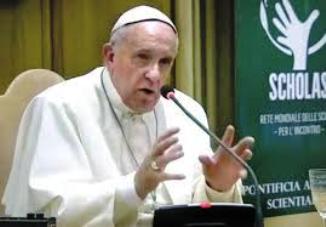 Giving all children and teenagers the education they need, to restore their dignity and allow them to build their own futures. This is the commitment of the many activities carried out by Scholas Occurentes (schools of dialogue) and the Focolare non-profit New Families Association (AFN) with programmes that focus on children and teenagers from around the world, with a teaching method based on values. The roots of Scholas, an international organisation that last June began operations in Italy with an official inauguration ceremony at their new base in Palazzo San Calisto in Rome, go back twenty years. George Mario Bergoglio was archbishop of Buenos Aires, and he perceived the importance of the so-called escuelas de vecinos. In 2013 Pope Francis transformed those schools of the quarter into a Pontifical Foundation so that they could promote their educational model on a global level. Currently the network has more than 400 million schools that are connected with each other from the five continents, from every religious and secular background and also public and private institutions in 900 countries. The pope attended the ceremony which was conducted by Lorena Bianchetti from Rai1. Our reporters were on hand as the Pope spoke off the cuff in Spanish with the young people from around the world who were linked up via internet. “In this society, ‘teaching’ often becomes ‘selecting,’” he stressed. “Instead, we need to ‘join hands, embrace, never attack or say that any human being is a ‘no’. Everyone is a ‘yes’ and has significant role.” Sometimes in education “we select badly, we create closed groups.” “We’re incapable of thinking with the other, incapable of working with the other,” the pope said. Instead, education is the capacity to speak “the language of the mind, heart and hands.” Therefore, “unity is needed within each one of us” said Francis: “If I believe what I feel, what I think, what I love – then I’m beginning.” “We’re living in a world where globalisation dominates, and globalization is good,” the pope explained, “but the danger is that of understanding, perceiving globalisation as a billiard ball – all of them are the same – a sphere in which everything is equidistant from the centre, but a sphere in which the personal characteristics of a boy or girl are obliterated.” Instead, “authentic globalization is more like a polyhedron where we seek unity, but each of us maintains his and her own peculiarity their own richness.”
Giving all children and teenagers the education they need, to restore their dignity and allow them to build their own futures. This is the commitment of the many activities carried out by Scholas Occurentes (schools of dialogue) and the Focolare non-profit New Families Association (AFN) with programmes that focus on children and teenagers from around the world, with a teaching method based on values. The roots of Scholas, an international organisation that last June began operations in Italy with an official inauguration ceremony at their new base in Palazzo San Calisto in Rome, go back twenty years. George Mario Bergoglio was archbishop of Buenos Aires, and he perceived the importance of the so-called escuelas de vecinos. In 2013 Pope Francis transformed those schools of the quarter into a Pontifical Foundation so that they could promote their educational model on a global level. Currently the network has more than 400 million schools that are connected with each other from the five continents, from every religious and secular background and also public and private institutions in 900 countries. The pope attended the ceremony which was conducted by Lorena Bianchetti from Rai1. Our reporters were on hand as the Pope spoke off the cuff in Spanish with the young people from around the world who were linked up via internet. “In this society, ‘teaching’ often becomes ‘selecting,’” he stressed. “Instead, we need to ‘join hands, embrace, never attack or say that any human being is a ‘no’. Everyone is a ‘yes’ and has significant role.” Sometimes in education “we select badly, we create closed groups.” “We’re incapable of thinking with the other, incapable of working with the other,” the pope said. Instead, education is the capacity to speak “the language of the mind, heart and hands.” Therefore, “unity is needed within each one of us” said Francis: “If I believe what I feel, what I think, what I love – then I’m beginning.” “We’re living in a world where globalisation dominates, and globalization is good,” the pope explained, “but the danger is that of understanding, perceiving globalisation as a billiard ball – all of them are the same – a sphere in which everything is equidistant from the centre, but a sphere in which the personal characteristics of a boy or girl are obliterated.” Instead, “authentic globalization is more like a polyhedron where we seek unity, but each of us maintains his and her own peculiarity their own richness.”  The president of Scholas, José María Del Corral, explained how fundamental that step was for the international growth of the foundation.” Moreover the closeness of the Holy Father is a stimulus to “intensify efforts on the educational front where young people are involved.” Also in Italy, he added, “Scholas appeals to all the sane forces of society to unite their efforts and to offer constructive collaboration.” This is the challenge for Scholas and for the Focolare AFNonlus who are project partners of some hundred activities in fifty countries around the world, as well as educational programmes for disadvantaged youth. “It’s a demanding project,” said president of the AFNonlus, Andrea Turatti. “The global classroom being created by the web will help to develop educational strategies, human and social development projects in a spirit of solidarity and in view of universal brotherhood.” Giovanna Pieroni Source: AFNonlus online
The president of Scholas, José María Del Corral, explained how fundamental that step was for the international growth of the foundation.” Moreover the closeness of the Holy Father is a stimulus to “intensify efforts on the educational front where young people are involved.” Also in Italy, he added, “Scholas appeals to all the sane forces of society to unite their efforts and to offer constructive collaboration.” This is the challenge for Scholas and for the Focolare AFNonlus who are project partners of some hundred activities in fifty countries around the world, as well as educational programmes for disadvantaged youth. “It’s a demanding project,” said president of the AFNonlus, Andrea Turatti. “The global classroom being created by the web will help to develop educational strategies, human and social development projects in a spirit of solidarity and in view of universal brotherhood.” Giovanna Pieroni Source: AFNonlus online

Jul 22, 2017 | Focolare Worldwide, Senza categoria
 Augustine provides us with one of the most valuable intuitions on prayer: “God’s ear hears the heart’s voice” (Comment on Psalm 148). Letting God’s ear rest on our heart, opening our heart to God’s ear: this is what it takes, this is the art of praying, an art, by the way, that’s for everyone. Actually, it’s not ours, but of the Spirit that God gives to us, the Spirit who prays in us, for we don’t know how or for what we should pray (cf Rm 8:26). […] Prayer is elevating the heart to God. But are we capable of that? Isn’t the range of our understanding too limited for our heart to be able to elevate itself to God? Isn’t the impulse of our heart too weak? Don’t burdens attach themselves to our heart and weigh on it, paralyze it and bring it down? What gives us the courage to claim: Our heart is turned to the Lord? His ear. He has lowered it to us. The Father listens to the Son. And the Son came down among us, into our flesh, into our heart. Within the heart of the Son, the Father listens to every beat of our heart, in the heart of the Son he finds our heart. In Him in whom we were made, loved, supported, gathered – the Father hears us. To elevate our heart means to leave it where it is and discover that where it is, with us, is the heart of God in the heart of his Son. Abandon yourself in Him and he will hold you. In Him, God’s ear is upon your heart; in Him your heart is at God’s ear. […] The opposite is just as true: God keeps his heart against your ear. He revealed, conveyed, gave, not something of Himself, but His Self. If you believe in him, if you adhere to Him, if you stick to Him, then you don’t hear a novelty, a directive, a command: you hear his heart. Stay near to Him until you discover this heart of yours. He’s in need of your patient listening in order to open your heart; actually, only patience comprehends love and learns love. He will reveal Himself to anyone who loves Him, and He makes His dwelling with that person (cf Jn 14:21-23). […] God has your heart at his ear, so that through your ear his heart penetrating your heart, might become your heart. The ear of God on your heart – the heart of God at your ear – like the alternating found in prayer. Only the pray-er knows God. Only the pray-er knows the human person. From Klaus Hemmerle, Con l’anima in ascolto, Guida alla preghiera,(Rome: Città Nuova Ed.,1989), 9-11.
Augustine provides us with one of the most valuable intuitions on prayer: “God’s ear hears the heart’s voice” (Comment on Psalm 148). Letting God’s ear rest on our heart, opening our heart to God’s ear: this is what it takes, this is the art of praying, an art, by the way, that’s for everyone. Actually, it’s not ours, but of the Spirit that God gives to us, the Spirit who prays in us, for we don’t know how or for what we should pray (cf Rm 8:26). […] Prayer is elevating the heart to God. But are we capable of that? Isn’t the range of our understanding too limited for our heart to be able to elevate itself to God? Isn’t the impulse of our heart too weak? Don’t burdens attach themselves to our heart and weigh on it, paralyze it and bring it down? What gives us the courage to claim: Our heart is turned to the Lord? His ear. He has lowered it to us. The Father listens to the Son. And the Son came down among us, into our flesh, into our heart. Within the heart of the Son, the Father listens to every beat of our heart, in the heart of the Son he finds our heart. In Him in whom we were made, loved, supported, gathered – the Father hears us. To elevate our heart means to leave it where it is and discover that where it is, with us, is the heart of God in the heart of his Son. Abandon yourself in Him and he will hold you. In Him, God’s ear is upon your heart; in Him your heart is at God’s ear. […] The opposite is just as true: God keeps his heart against your ear. He revealed, conveyed, gave, not something of Himself, but His Self. If you believe in him, if you adhere to Him, if you stick to Him, then you don’t hear a novelty, a directive, a command: you hear his heart. Stay near to Him until you discover this heart of yours. He’s in need of your patient listening in order to open your heart; actually, only patience comprehends love and learns love. He will reveal Himself to anyone who loves Him, and He makes His dwelling with that person (cf Jn 14:21-23). […] God has your heart at his ear, so that through your ear his heart penetrating your heart, might become your heart. The ear of God on your heart – the heart of God at your ear – like the alternating found in prayer. Only the pray-er knows God. Only the pray-er knows the human person. From Klaus Hemmerle, Con l’anima in ascolto, Guida alla preghiera,(Rome: Città Nuova Ed.,1989), 9-11.
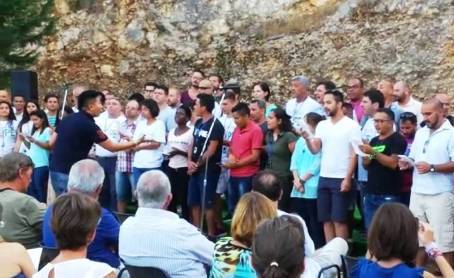
Jul 21, 2017 | Focolare Worldwide
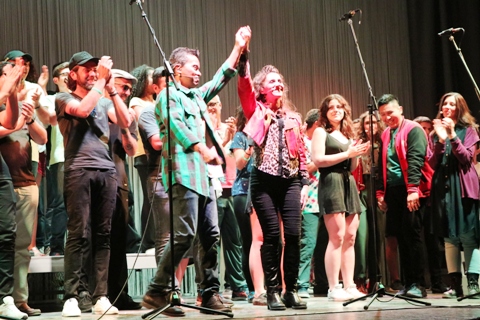 “Every life has hope.” This is the recurring theme of Fazenda da Esperança in all of its locations around the world. “We’ve seen and lived through hell, but during these days we’ve been changed into artists.” This was one of the statements gathered during an exchange of experiences at the conclusion of the five days of work that included two presentations of “Campus – The Musical”. A hundred and ten young people from Fazenda da Esperança and from Puglia, southern Italy, were prepared in workshops on dance, voice, theatre and percussion to then go out on stage with Gen Rosso at the Fasano city Kennedy Theatre for several scenes of Campus, last 7th and 8th of July. “We had to learn it fast and well in spite of the heat and our own limitations.” The motto helped: Welcome the different. There were people from 15 countries, from different cultures, age groups and backgrounds…”
“Every life has hope.” This is the recurring theme of Fazenda da Esperança in all of its locations around the world. “We’ve seen and lived through hell, but during these days we’ve been changed into artists.” This was one of the statements gathered during an exchange of experiences at the conclusion of the five days of work that included two presentations of “Campus – The Musical”. A hundred and ten young people from Fazenda da Esperança and from Puglia, southern Italy, were prepared in workshops on dance, voice, theatre and percussion to then go out on stage with Gen Rosso at the Fasano city Kennedy Theatre for several scenes of Campus, last 7th and 8th of July. “We had to learn it fast and well in spite of the heat and our own limitations.” The motto helped: Welcome the different. There were people from 15 countries, from different cultures, age groups and backgrounds…” 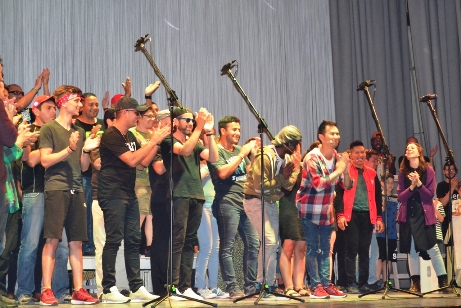 Our adrenaline was really pumping just as we got on stage to give the best of ourselves, while fear and worry seemed to disappear as we encouraged each another. Several said: “We felt a strength from above that was supporting us and instilling faith in ourselves.” “The thing I learned was never to stop during the show because of a mistake: this made me think a lot. I’ll carry this into my daily life, always continuing on in spite of the failures.”
Our adrenaline was really pumping just as we got on stage to give the best of ourselves, while fear and worry seemed to disappear as we encouraged each another. Several said: “We felt a strength from above that was supporting us and instilling faith in ourselves.” “The thing I learned was never to stop during the show because of a mistake: this made me think a lot. I’ll carry this into my daily life, always continuing on in spite of the failures.”  The inauguration of a new Fazenda da Esperança was held on Sunday, July 9, in Monopoli. It was attended by civil and religious leaders, Gen Rosso and a group of 60 youth “missionaries” from the Fazende, who came from around the world, together with their founders. The experience of several young people who had been in prison and were now helping other young people like themselves, was quite meaningful. “For us from Gen Rosso,” Franco explains, “collaborating with the Fazenda, as we have been for many years, is always a great enrichment and gives a decisive push to welcome the strong signs of hope that can be found anywhere in the world.” The festival concluded with the singing of Io ero lì (I’ve been there), a song written by Gen Rosso in tribute to Fazenda da Esperança. Gustavo Clariá
The inauguration of a new Fazenda da Esperança was held on Sunday, July 9, in Monopoli. It was attended by civil and religious leaders, Gen Rosso and a group of 60 youth “missionaries” from the Fazende, who came from around the world, together with their founders. The experience of several young people who had been in prison and were now helping other young people like themselves, was quite meaningful. “For us from Gen Rosso,” Franco explains, “collaborating with the Fazenda, as we have been for many years, is always a great enrichment and gives a decisive push to welcome the strong signs of hope that can be found anywhere in the world.” The festival concluded with the singing of Io ero lì (I’ve been there), a song written by Gen Rosso in tribute to Fazenda da Esperança. Gustavo Clariá
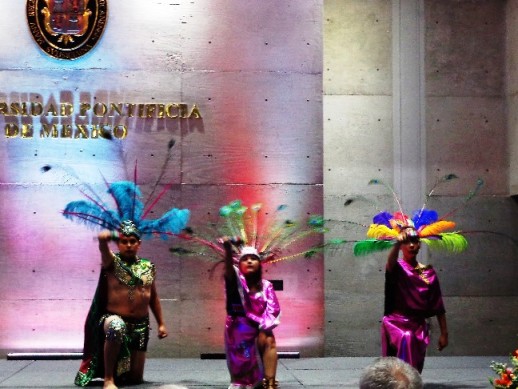
Jul 20, 2017 | Focolare Worldwide, Senza categoria
1944: Chiara Lubich left her beloved books in the attic to join the school of the one teacher, Jesus, leaving behind her dream to study philosophy at Catholic University, where she had thought she would be able to know God. Fifty-three years later, Catholic University of Mexico City conferred on her an honorary doctorate in philosophy.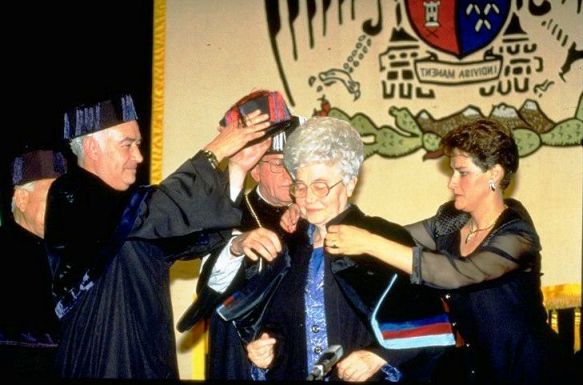 It’s been 20 years since the honorary doctorate, and the Focolare community in Mexico organized three events in memory of her message and to fulfill it: the philosophy of being, the Church as communion, and inculturation. June 29, 2017: “The face of God as communion” was the title of the symposium held at the Pontifical University of Mexico. Msgr Piero Coda, Dean of the Sophia University Institute, conducted two conferences: “Pope Francis: four points for an emerging Church” and “Chiara Lubich: a mysticism of ‘us’ to live through the change.” T
It’s been 20 years since the honorary doctorate, and the Focolare community in Mexico organized three events in memory of her message and to fulfill it: the philosophy of being, the Church as communion, and inculturation. June 29, 2017: “The face of God as communion” was the title of the symposium held at the Pontifical University of Mexico. Msgr Piero Coda, Dean of the Sophia University Institute, conducted two conferences: “Pope Francis: four points for an emerging Church” and “Chiara Lubich: a mysticism of ‘us’ to live through the change.” T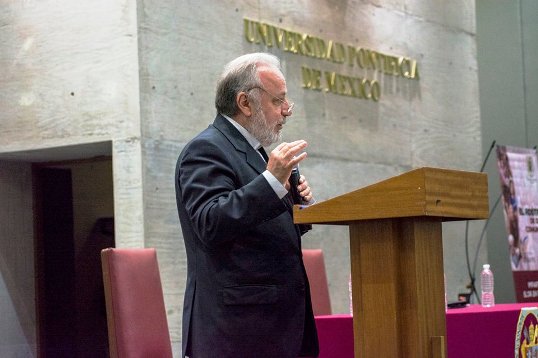 hese two reflections urged those present, mostly priests and men and women religious, towards pastoral work that shows a Church that is merciful, synodal, humble and open. “What surfaced,” affirmed Msgr Coda, “is the need to maintain an open dialogue with the vibrant strength that is in the Mexican church, to enthusiastically take up the challenge of pastoral change as advocated by Pope Francis. This encourages efforts by the laity at a cultural and societal level, working closely with young people, and the work of synods in the Church, where charisms can give their contribution.” June 30, 2017: Welcoming everyone to the hall at La Salle University in Mexico City, Dr Enrique Alejandro González Alvarez, dean of the university, explained the importance of the honoris causa doctorate conferred on Chiara Lubich in 1997. “Through her acceptance, it was she who honored the university,” he said, pointing to the profound harmony between the charism of unity and that of La Salle. “The University identifies with the Focolare Movement, because we work as allies to bring the kingdom of God here on earth, which without a doubt was Chiara’s primary mission,” Alvarez said. “May we continue to tighten the bonds that unite us. This is not only Chiara Lubich’s home, but of all who carry on in her spirit, so that today she can continue to live through her followers.” For the occasion Msgr Coda conducted a conference on “Chiara Lubich’s contribution to a new philosophy of being.” “Chiara’s speech 20 years ago,” Coda said, “showed itself to be prophetic for Mexico, as a new search for meaning and light, and the need for a new cultural paradigm at the social and cultural level. So her talk gave direction and can be connected to the commitment of Sophia University Institute.” New contacts and plans to collaborate were established between Sophia University Institute, the Pontifical University of Mexico and La Salle University.
hese two reflections urged those present, mostly priests and men and women religious, towards pastoral work that shows a Church that is merciful, synodal, humble and open. “What surfaced,” affirmed Msgr Coda, “is the need to maintain an open dialogue with the vibrant strength that is in the Mexican church, to enthusiastically take up the challenge of pastoral change as advocated by Pope Francis. This encourages efforts by the laity at a cultural and societal level, working closely with young people, and the work of synods in the Church, where charisms can give their contribution.” June 30, 2017: Welcoming everyone to the hall at La Salle University in Mexico City, Dr Enrique Alejandro González Alvarez, dean of the university, explained the importance of the honoris causa doctorate conferred on Chiara Lubich in 1997. “Through her acceptance, it was she who honored the university,” he said, pointing to the profound harmony between the charism of unity and that of La Salle. “The University identifies with the Focolare Movement, because we work as allies to bring the kingdom of God here on earth, which without a doubt was Chiara’s primary mission,” Alvarez said. “May we continue to tighten the bonds that unite us. This is not only Chiara Lubich’s home, but of all who carry on in her spirit, so that today she can continue to live through her followers.” For the occasion Msgr Coda conducted a conference on “Chiara Lubich’s contribution to a new philosophy of being.” “Chiara’s speech 20 years ago,” Coda said, “showed itself to be prophetic for Mexico, as a new search for meaning and light, and the need for a new cultural paradigm at the social and cultural level. So her talk gave direction and can be connected to the commitment of Sophia University Institute.” New contacts and plans to collaborate were established between Sophia University Institute, the Pontifical University of Mexico and La Salle University. The Focolare community threw a celebration in honor of June 7, 1997, together with the apostolic nuncio, Msgr Franco Coppola, and the Dean of the Pontifical University of Mexico, Dr Mario Ángel Flores Ramos. There was music, dance, video and testimonies from those present on that memorable day, which served as the perfect context to rediscover the depth of Chiara Lubich’s message. “In the basilica of the Madonna of Guadalupe,” said Maria Voce in her message to the Mexican community, “in front of the ‘Morenita,’ Chiara highlighted the wonderful symbols that Mary clothed herself in, presenting her as an extraordinary example of inculturation.” Chiara’s legacy, which obviously echoed the original message of Guadalupe, still strongly resonates, Focolare’s president said. “Let’s entrust ourselves to her, icon of the ‘culture of meeting,’ so that we might fully ‘make ourselves one’ and bring the spirituality of communion everywhere.”
The Focolare community threw a celebration in honor of June 7, 1997, together with the apostolic nuncio, Msgr Franco Coppola, and the Dean of the Pontifical University of Mexico, Dr Mario Ángel Flores Ramos. There was music, dance, video and testimonies from those present on that memorable day, which served as the perfect context to rediscover the depth of Chiara Lubich’s message. “In the basilica of the Madonna of Guadalupe,” said Maria Voce in her message to the Mexican community, “in front of the ‘Morenita,’ Chiara highlighted the wonderful symbols that Mary clothed herself in, presenting her as an extraordinary example of inculturation.” Chiara’s legacy, which obviously echoed the original message of Guadalupe, still strongly resonates, Focolare’s president said. “Let’s entrust ourselves to her, icon of the ‘culture of meeting,’ so that we might fully ‘make ourselves one’ and bring the spirituality of communion everywhere.”
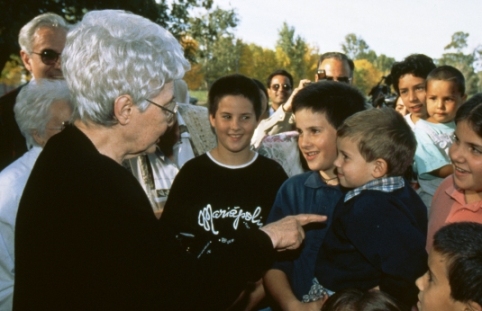
Jul 19, 2017 | Non categorizzato
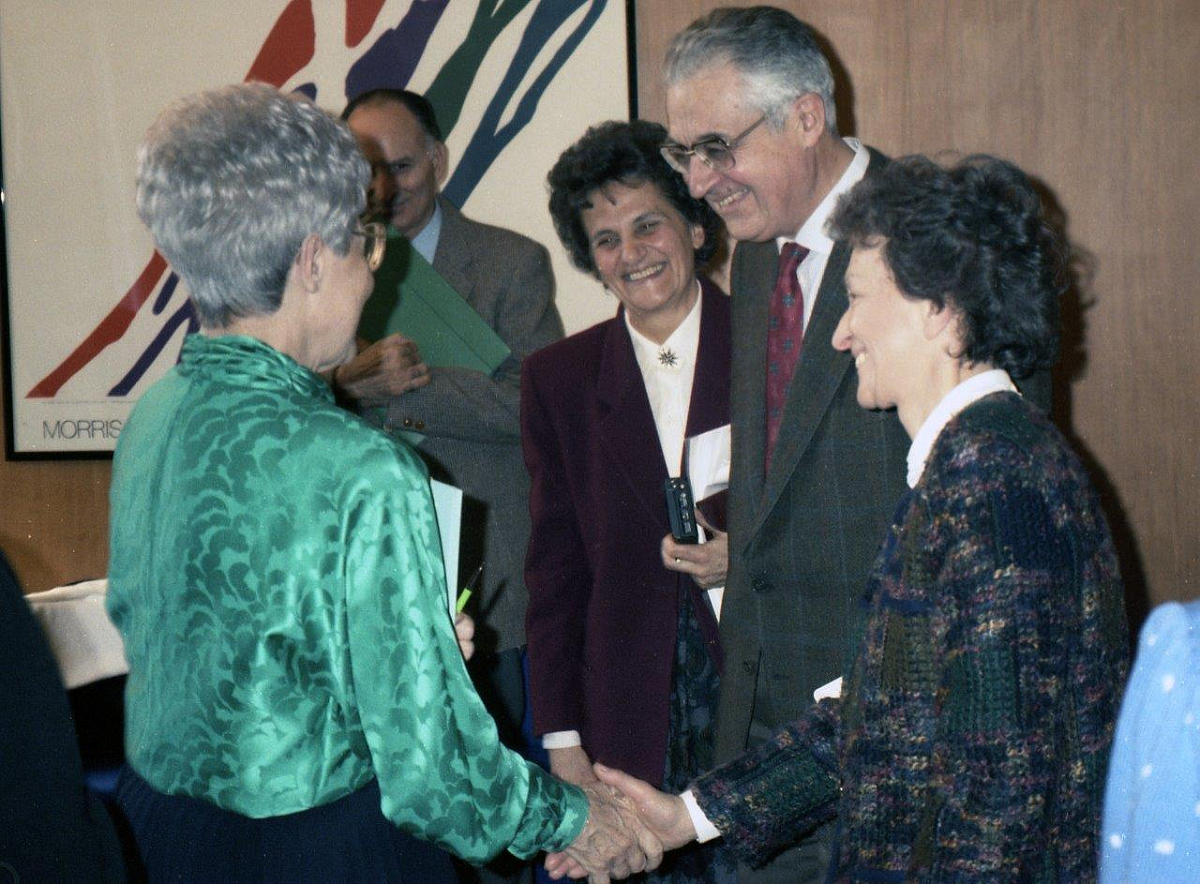 During the first school for married focolarini, Chiara Lubich paraphrased what Pope Paul VI had said a day earlier at the General Audience. Chiara announced on that July 19, 1967, that “an explosive, apostolic and diffusive Movement” for families would be born at the very heart of the Focolare. Fifty years later it is easy to see that those words were proven to be true. Married and engaged couples and many others who have a part in the world of the family have seen their love for one another grow through their contact with the charism of unity, transforming it into a living witness of love for God and for the human family. That love has also resulted in the Movement spreading in a large part of the world’s countries.
During the first school for married focolarini, Chiara Lubich paraphrased what Pope Paul VI had said a day earlier at the General Audience. Chiara announced on that July 19, 1967, that “an explosive, apostolic and diffusive Movement” for families would be born at the very heart of the Focolare. Fifty years later it is easy to see that those words were proven to be true. Married and engaged couples and many others who have a part in the world of the family have seen their love for one another grow through their contact with the charism of unity, transforming it into a living witness of love for God and for the human family. That love has also resulted in the Movement spreading in a large part of the world’s countries.  New Families is committed to giving an answer to the needs of today’s family that is in line with “Amoris Laetitia” (“The Joy of Love”). They don’t do it with words, but with the concrete fruit of the real life experiences by a multitude of families with their testimonies of unity, and with their hundreds of projects of international cooperation and at-a-distance support. They work for the renewal of society and for the realization of Jesus’s testament: “that all may be one.”
New Families is committed to giving an answer to the needs of today’s family that is in line with “Amoris Laetitia” (“The Joy of Love”). They don’t do it with words, but with the concrete fruit of the real life experiences by a multitude of families with their testimonies of unity, and with their hundreds of projects of international cooperation and at-a-distance support. They work for the renewal of society and for the realization of Jesus’s testament: “that all may be one.”

Jul 18, 2017 | Non categorizzato
 The mayor Against my wishes, my husband became a mayoral candidate, not out of ambition, but purely for the sake of of serving the community. My resistance to the idea came from the fear that, since our town can be a difficult place, such a committment could have negative repercussions for our family. But any argument or ultimatum of mine had no effect. One Saturday morning I saw in the paper that he had signed up to be a candidate. I started feeling really sick. The day after at mass, the Gospel spoke of the fruitless fig tree. In that moment I felt like that fig tree, not able to bear fruit. And not just that: my attitude was also blocking my husband from bearing fruit for the community. I understood that Jesus was asking me to give him even my family, despite my fears. When I returned home, I told my husband and our daughters my experience, and we all agreed to support him. Ever since that moment I have been at this side for all the rallies and speeches, and now that he is mayor I continue to do so for all his official visits. (F.D. – Italy) Tensions at home My husband and I had just got home, tired and stressed. Losing control, we got into a violent argument, to the point that it seemed that our marriage had come to an end. I then tried to mend the situation, but he remained quite angry at my way of doing things. The day after we were meant to go to help a poor family. But wouldn’t that have just been an easy way out if we didn’t first reestablish peace and harmony with my husband? Even though all my good reasons kept coming to mind continually, I tried to overcome them. On top of that, he was going to an important meeting that same day. Overcoming my fear of how he would react, I called him and asked his forgiveness. All was forgotten, and I felt free and loved, and this also gave meaning to my giving to others. (F. – Panama) Shards I can see the street from my office, and one day I saw Michael pass by. He’s homeless and usually argues with everyone when he’s drunk. This time he stopped and picked up the remains of a broken bottle and put it in the garbage. Then he moved on. I had noticed the glass too, but had not gathered up the pieces because I was in a hurry. What a lesson, and from someone who is on the margins of society! I imagined Michael at the Gospel’s Last Judgment, with Jesus saying: “Enter into my kingdom: you gathered the glass that could have hurt one of my brothers – you did it for me!” (P.O. – ltaly) Dirty socks In the locker room at the pool a disheveled elderly lady was seated on a bench, with some socks next to her that were pretty dirty. Everyone stayed clear of her, including me. She was having a hard time putting on a singlet because her body was still wet, so I went over to help. Thankful, she asked me if I could also help her with her socks. Oh my. Really? Then I immediately had a thought: “Jesus, it is you in her who are coming to meet me.” I kneeled down and helped her with her socks and shoes. Even today I can still remember the joy I felt. (Rosemarie – Switzerland)
The mayor Against my wishes, my husband became a mayoral candidate, not out of ambition, but purely for the sake of of serving the community. My resistance to the idea came from the fear that, since our town can be a difficult place, such a committment could have negative repercussions for our family. But any argument or ultimatum of mine had no effect. One Saturday morning I saw in the paper that he had signed up to be a candidate. I started feeling really sick. The day after at mass, the Gospel spoke of the fruitless fig tree. In that moment I felt like that fig tree, not able to bear fruit. And not just that: my attitude was also blocking my husband from bearing fruit for the community. I understood that Jesus was asking me to give him even my family, despite my fears. When I returned home, I told my husband and our daughters my experience, and we all agreed to support him. Ever since that moment I have been at this side for all the rallies and speeches, and now that he is mayor I continue to do so for all his official visits. (F.D. – Italy) Tensions at home My husband and I had just got home, tired and stressed. Losing control, we got into a violent argument, to the point that it seemed that our marriage had come to an end. I then tried to mend the situation, but he remained quite angry at my way of doing things. The day after we were meant to go to help a poor family. But wouldn’t that have just been an easy way out if we didn’t first reestablish peace and harmony with my husband? Even though all my good reasons kept coming to mind continually, I tried to overcome them. On top of that, he was going to an important meeting that same day. Overcoming my fear of how he would react, I called him and asked his forgiveness. All was forgotten, and I felt free and loved, and this also gave meaning to my giving to others. (F. – Panama) Shards I can see the street from my office, and one day I saw Michael pass by. He’s homeless and usually argues with everyone when he’s drunk. This time he stopped and picked up the remains of a broken bottle and put it in the garbage. Then he moved on. I had noticed the glass too, but had not gathered up the pieces because I was in a hurry. What a lesson, and from someone who is on the margins of society! I imagined Michael at the Gospel’s Last Judgment, with Jesus saying: “Enter into my kingdom: you gathered the glass that could have hurt one of my brothers – you did it for me!” (P.O. – ltaly) Dirty socks In the locker room at the pool a disheveled elderly lady was seated on a bench, with some socks next to her that were pretty dirty. Everyone stayed clear of her, including me. She was having a hard time putting on a singlet because her body was still wet, so I went over to help. Thankful, she asked me if I could also help her with her socks. Oh my. Really? Then I immediately had a thought: “Jesus, it is you in her who are coming to meet me.” I kneeled down and helped her with her socks and shoes. Even today I can still remember the joy I felt. (Rosemarie – Switzerland)
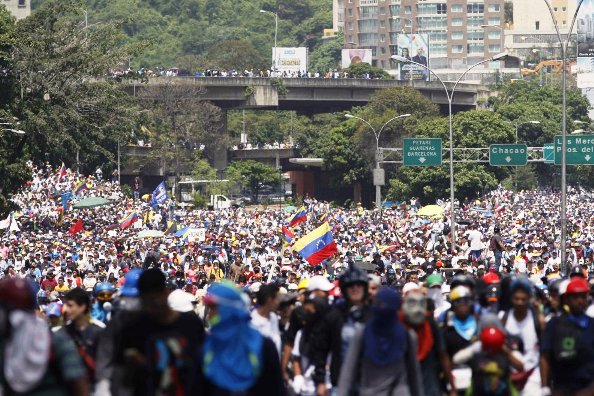
Jul 17, 2017 | Focolare Worldwide
I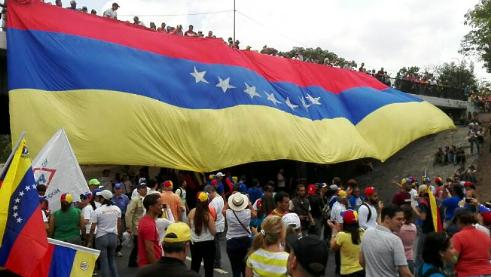 heard on TV… I’m watching the news, continually being interrupted by appeals from the public utility commission. The last one just said: “Urgently needed pharmacy drug…” My God! I jot down the telephone number and call. They tell me that person in need is an elderly woman, that it’s really urgent and that she lives in the same city as me. I quickly contact the lady’s children, but in this moment the situation on the streets doesn’t allow me to go out. We agree to meet the next day, early in the morning, in fron of the community health centre. When we finally meet, the lady asks me: “How much does the medicine cost?” I asked for it from the United States, but they weren’t able to send it to me.” “Nothing, ma’am,” I answer. “Let’s pray together that peace quickly returns to Venezuela.” We don’t know each other but hug and say goodbye. There is more happiness in giving than in receiving My friend calls me: “Do you by any chance have this medicine? I can’t find it anywhere . . .” It happened to be just the medicine that a woman had donated to my parish. In that moment I had thought: “But will this be useful to anyone?” It’s a very specific medicine…” It was jus the one my friend needed, with the exact dosage information – and there were 50 pills! God knows what each person needs. The happiness was shared, but mine was greater.
heard on TV… I’m watching the news, continually being interrupted by appeals from the public utility commission. The last one just said: “Urgently needed pharmacy drug…” My God! I jot down the telephone number and call. They tell me that person in need is an elderly woman, that it’s really urgent and that she lives in the same city as me. I quickly contact the lady’s children, but in this moment the situation on the streets doesn’t allow me to go out. We agree to meet the next day, early in the morning, in fron of the community health centre. When we finally meet, the lady asks me: “How much does the medicine cost?” I asked for it from the United States, but they weren’t able to send it to me.” “Nothing, ma’am,” I answer. “Let’s pray together that peace quickly returns to Venezuela.” We don’t know each other but hug and say goodbye. There is more happiness in giving than in receiving My friend calls me: “Do you by any chance have this medicine? I can’t find it anywhere . . .” It happened to be just the medicine that a woman had donated to my parish. In that moment I had thought: “But will this be useful to anyone?” It’s a very specific medicine…” It was jus the one my friend needed, with the exact dosage information – and there were 50 pills! God knows what each person needs. The happiness was shared, but mine was greater.  Create bridges with people from other Churches I received an SMS: “I would need this medicine, do you have it by chance?” Yes, I had it and asked Armando to take it over to him, since the one asking was an Evangelical like him. I also thought of asking: “If by any chance you any medicine that we’re looking for, would you return the favor?” She sent me the exact medicine that is hard to find in pharmacies, equipped with a nebulizer. She gave mine to another person who wasn’t able to expectorate because of a strong cough. I was an experience of the Gospel sentence: “Give and it will be given to you.” Moreover, the medicine I received was of a superior quality and with fewer side effects than the one I had before. It’s amazing: when you give, love is transformed into brotherhood. Sunday, day of rest… It’s Sunday!!! Finally I can get some rest! I planned on a very interesting film when, all of a sudden, the doorbell rings. I begin to fear that rest in relaxation is in danger. Seeing my reaction, my son asked if I would like him to tell the person at the door to come back at a nother moment. I almost say yes . . . but no . . . I’ll open it. I see an acquaintance standing there who asks me if I’m busy. She had an urgent look on her face. I let her in. “I just ahvef to talk with you…” “Okay, come in. My husband’s here too. Is it okay if he joins us?” We sit there for three hours listening to her. She tell us she wants a divorce, but before telling it to her husband and filing the papers, she thought of talking to us. It’s not easy to listen to her venting filled with pain, misunderstanding and anger…At the end, many of her doubts are clarified. We conclude with a prayer and the decision to start being the first to love. Thus she returns home with renewed strength and ready for the fight to save her marriage. It was a Sunday spent as the Day of the Lord, in which we think we did what Jesus would have done – loved without judging.
Create bridges with people from other Churches I received an SMS: “I would need this medicine, do you have it by chance?” Yes, I had it and asked Armando to take it over to him, since the one asking was an Evangelical like him. I also thought of asking: “If by any chance you any medicine that we’re looking for, would you return the favor?” She sent me the exact medicine that is hard to find in pharmacies, equipped with a nebulizer. She gave mine to another person who wasn’t able to expectorate because of a strong cough. I was an experience of the Gospel sentence: “Give and it will be given to you.” Moreover, the medicine I received was of a superior quality and with fewer side effects than the one I had before. It’s amazing: when you give, love is transformed into brotherhood. Sunday, day of rest… It’s Sunday!!! Finally I can get some rest! I planned on a very interesting film when, all of a sudden, the doorbell rings. I begin to fear that rest in relaxation is in danger. Seeing my reaction, my son asked if I would like him to tell the person at the door to come back at a nother moment. I almost say yes . . . but no . . . I’ll open it. I see an acquaintance standing there who asks me if I’m busy. She had an urgent look on her face. I let her in. “I just ahvef to talk with you…” “Okay, come in. My husband’s here too. Is it okay if he joins us?” We sit there for three hours listening to her. She tell us she wants a divorce, but before telling it to her husband and filing the papers, she thought of talking to us. It’s not easy to listen to her venting filled with pain, misunderstanding and anger…At the end, many of her doubts are clarified. We conclude with a prayer and the decision to start being the first to love. Thus she returns home with renewed strength and ready for the fight to save her marriage. It was a Sunday spent as the Day of the Lord, in which we think we did what Jesus would have done – loved without judging.
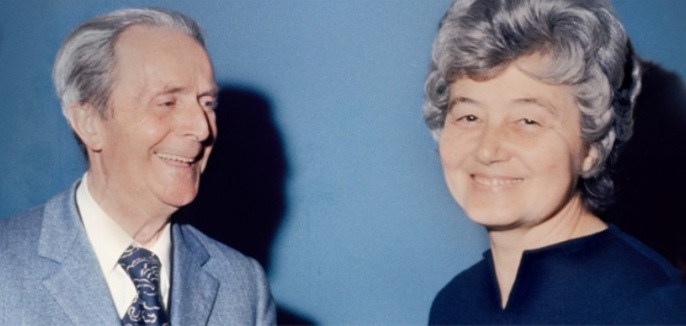
Jul 15, 2017 | Non categorizzato
« While playing games in the shade of the fir trees beneath the rocks, Chiara continued to speak to her companions about God, the Virgin, and supernatural life, the nature of which was supranature. She co-inhabited always with the Lord, an effect of charity which was edified, atom upon atom.. And so when they would go to the countryside, those alpine forests were transformed into cathedrals, treetops seemed like the heights of holy cities, and flowers and grass were coloured by the presence of angels and saints: all were enlivened in God. The material barriers were removed. This was also a form of reconciliation between the sacred and the profane, due to which, once the ugly, the evil, and the deformed were eliminated, everywhere the values of the life of nature were recovered in all its aspects. Her words, like her works seemed to be an assiduous clearance of mortal debris to reestablish communication. In itself it was simply a merging of nature and the supernatural, of matter with the spirit, and of the earth with heaven. It was a duplication of the values of life on earth, to open a gateway to Paradise. It was the summer of 1949. That enjoyable holiday was enhanced by the inheritance of a cottage in Tonadico di Primiero from Lia Brunet. In July, Chiara Lubich, Foco (Igino Giordani) and the focolarine had gone there to bask in the sunlight and take some personal rest, after the works achieved all year round for the poor. The cottage consisted of an upper barn which they entered through a winding ladder from the ground floor, and was composed of a room and small kitchen. They set up some cot beds and a cupboard that was hauled up by a winch, and the place acted as their dorm. Foco went to the Orsinger Hotel and had the chance to speak before the hall of Capuchins. In their Church he felt the desire to bind himself “tightly” with a vow of obedience, which Chiara felt, however, did not conform to Focolare customs. Instead she proposed making a pact of untiy, in the sense that at the next Eucharistic communion, on the nothingness of their souls, Jesus in her would seal the pact with Jesus in him. That morning at mass, upon receiving communion the two of them made Jesus seal the pact with Jesus. It was then that she started to experience a series of enlightening insights». Igino Giordani, History of the Focolare Movement, an unedited piece.
While playing games in the shade of the fir trees beneath the rocks, Chiara continued to speak to her companions about God, the Virgin, and supernatural life, the nature of which was supranature. She co-inhabited always with the Lord, an effect of charity which was edified, atom upon atom.. And so when they would go to the countryside, those alpine forests were transformed into cathedrals, treetops seemed like the heights of holy cities, and flowers and grass were coloured by the presence of angels and saints: all were enlivened in God. The material barriers were removed. This was also a form of reconciliation between the sacred and the profane, due to which, once the ugly, the evil, and the deformed were eliminated, everywhere the values of the life of nature were recovered in all its aspects. Her words, like her works seemed to be an assiduous clearance of mortal debris to reestablish communication. In itself it was simply a merging of nature and the supernatural, of matter with the spirit, and of the earth with heaven. It was a duplication of the values of life on earth, to open a gateway to Paradise. It was the summer of 1949. That enjoyable holiday was enhanced by the inheritance of a cottage in Tonadico di Primiero from Lia Brunet. In July, Chiara Lubich, Foco (Igino Giordani) and the focolarine had gone there to bask in the sunlight and take some personal rest, after the works achieved all year round for the poor. The cottage consisted of an upper barn which they entered through a winding ladder from the ground floor, and was composed of a room and small kitchen. They set up some cot beds and a cupboard that was hauled up by a winch, and the place acted as their dorm. Foco went to the Orsinger Hotel and had the chance to speak before the hall of Capuchins. In their Church he felt the desire to bind himself “tightly” with a vow of obedience, which Chiara felt, however, did not conform to Focolare customs. Instead she proposed making a pact of untiy, in the sense that at the next Eucharistic communion, on the nothingness of their souls, Jesus in her would seal the pact with Jesus in him. That morning at mass, upon receiving communion the two of them made Jesus seal the pact with Jesus. It was then that she started to experience a series of enlightening insights». Igino Giordani, History of the Focolare Movement, an unedited piece.
Jul 14, 2017 | Non categorizzato
On July 12th the Venezuelan bishops sent out an “urgent message to Catholics and all people of good will.” They ask the government to “retract the proposal of a constituent assembly and allow the elections that are authorized by the Constitution,” and to “recognize the autonomy of the public authorities, abandoning the inhuman repression of those who show dissent, to dismantle armed groups” and free “the people that were deprived of their freedom for political reasons.” The bishops called upon political leaders to be committed “solely to the people and never to their own self interests,” respecting “the democratic will of the Venezuelan people.” Moreover, to work at “solving the very serious problems of the people and to allow humanitarian aid to reach those who need it most.” They asked the National Armed Forces to “perform their duty of serving the people with respect and in accordance with the constitution.” They ask educational and cultural institutions to collaborate in “bringing down the walls that divide the country,” encouraging “every effort in favour of peace and coexistence, based on the law of brotherly love.” The message concludes with an invitation to “our brothers in the faith and other believers, to a Day of Prayer and Fasting on July 21st, to ask God to bless the efforts of the Venezuelan people in favour of freedom, justice and peace.”
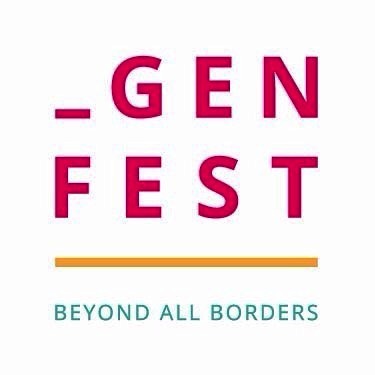
Jul 14, 2017 | Focolare Worldwide
 A project that is already a real life experience, an invitation to build bridges of brotherhood and contribute to the tearing down of barriers of indifference, prejudice and selfishness. Begun in 1973 from an idea of Chiara Lubich, foundress of the Focolare Movement, the Genfest is a gathering of young people from across the globe. The 11th edition of Genfest will be held in Manila. The Genfest has turned out to be a festival of ideas and projects that inspire thousands of young people from different ethnic groups, cultures and religions to change and point their lives towards ideals of brotherhood and a united world. The main event will be held in the World Trade Centre Metro Manila, while all the workshops will be held at De La Salle University. BEYOND ALL BORDERS is the title of the next Genfest, which underscores the frontiers to be overcome both personally and as a society in order to build a happier and more united world, to breathe, love, work and live with an open and inclusive vision. The program will include musical and artistic performances, forums and expos. The Genfest’s logo can be summed up in one word: essential. “Less is more.” In a world where communications and information is too much, the message from Manila will be marked by simplicity and the power that every word can bring to the world. Therefore, the Genfest logo is made of only three letters and a simple line underneath the title. A stark symbol that calls us to beyond the borders, to underscore the only thing that matters in life: reaching out to everyone and moving together toward universal brotherhood. Contact us: info@y4uw.org Registration will begin from October 2017 Source: Y4UW International https://www.youtube.com/watch?v=C8NvjNYgNEc
A project that is already a real life experience, an invitation to build bridges of brotherhood and contribute to the tearing down of barriers of indifference, prejudice and selfishness. Begun in 1973 from an idea of Chiara Lubich, foundress of the Focolare Movement, the Genfest is a gathering of young people from across the globe. The 11th edition of Genfest will be held in Manila. The Genfest has turned out to be a festival of ideas and projects that inspire thousands of young people from different ethnic groups, cultures and religions to change and point their lives towards ideals of brotherhood and a united world. The main event will be held in the World Trade Centre Metro Manila, while all the workshops will be held at De La Salle University. BEYOND ALL BORDERS is the title of the next Genfest, which underscores the frontiers to be overcome both personally and as a society in order to build a happier and more united world, to breathe, love, work and live with an open and inclusive vision. The program will include musical and artistic performances, forums and expos. The Genfest’s logo can be summed up in one word: essential. “Less is more.” In a world where communications and information is too much, the message from Manila will be marked by simplicity and the power that every word can bring to the world. Therefore, the Genfest logo is made of only three letters and a simple line underneath the title. A stark symbol that calls us to beyond the borders, to underscore the only thing that matters in life: reaching out to everyone and moving together toward universal brotherhood. Contact us: info@y4uw.org Registration will begin from October 2017 Source: Y4UW International https://www.youtube.com/watch?v=C8NvjNYgNEc

 Giving all children and teenagers the education they need, to restore their dignity and allow them to build their own futures. This is the commitment of the many activities carried out by Scholas Occurentes (schools of dialogue) and the Focolare non-profit New Families Association (AFN) with programmes that focus on children and teenagers from around the world, with a teaching method based on values. The roots of Scholas, an international organisation that last June began operations in Italy with an official inauguration ceremony at their new base in Palazzo San Calisto in Rome, go back twenty years. George Mario Bergoglio was archbishop of Buenos Aires, and he perceived the importance of the so-called escuelas de vecinos. In 2013 Pope Francis transformed those schools of the quarter into a Pontifical Foundation so that they could promote their educational model on a global level. Currently the network has more than 400 million schools that are connected with each other from the five continents, from every religious and secular background and also public and private institutions in 900 countries. The pope attended the ceremony which was conducted by Lorena Bianchetti from Rai1. Our reporters were on hand as the Pope spoke off the cuff in Spanish with the young people from around the world who were linked up via internet. “In this society, ‘teaching’ often becomes ‘selecting,’” he stressed. “Instead, we need to ‘join hands, embrace, never attack or say that any human being is a ‘no’. Everyone is a ‘yes’ and has significant role.” Sometimes in education “we select badly, we create closed groups.” “We’re incapable of thinking with the other, incapable of working with the other,” the pope said. Instead, education is the capacity to speak “the language of the mind, heart and hands.” Therefore, “unity is needed within each one of us” said Francis: “If I believe what I feel, what I think, what I love – then I’m beginning.” “We’re living in a world where globalisation dominates, and globalization is good,” the pope explained, “but the danger is that of understanding, perceiving globalisation as a billiard ball – all of them are the same – a sphere in which everything is equidistant from the centre, but a sphere in which the personal characteristics of a boy or girl are obliterated.” Instead, “authentic globalization is more like a polyhedron where we seek unity, but each of us maintains his and her own peculiarity their own richness.”
Giving all children and teenagers the education they need, to restore their dignity and allow them to build their own futures. This is the commitment of the many activities carried out by Scholas Occurentes (schools of dialogue) and the Focolare non-profit New Families Association (AFN) with programmes that focus on children and teenagers from around the world, with a teaching method based on values. The roots of Scholas, an international organisation that last June began operations in Italy with an official inauguration ceremony at their new base in Palazzo San Calisto in Rome, go back twenty years. George Mario Bergoglio was archbishop of Buenos Aires, and he perceived the importance of the so-called escuelas de vecinos. In 2013 Pope Francis transformed those schools of the quarter into a Pontifical Foundation so that they could promote their educational model on a global level. Currently the network has more than 400 million schools that are connected with each other from the five continents, from every religious and secular background and also public and private institutions in 900 countries. The pope attended the ceremony which was conducted by Lorena Bianchetti from Rai1. Our reporters were on hand as the Pope spoke off the cuff in Spanish with the young people from around the world who were linked up via internet. “In this society, ‘teaching’ often becomes ‘selecting,’” he stressed. “Instead, we need to ‘join hands, embrace, never attack or say that any human being is a ‘no’. Everyone is a ‘yes’ and has significant role.” Sometimes in education “we select badly, we create closed groups.” “We’re incapable of thinking with the other, incapable of working with the other,” the pope said. Instead, education is the capacity to speak “the language of the mind, heart and hands.” Therefore, “unity is needed within each one of us” said Francis: “If I believe what I feel, what I think, what I love – then I’m beginning.” “We’re living in a world where globalisation dominates, and globalization is good,” the pope explained, “but the danger is that of understanding, perceiving globalisation as a billiard ball – all of them are the same – a sphere in which everything is equidistant from the centre, but a sphere in which the personal characteristics of a boy or girl are obliterated.” Instead, “authentic globalization is more like a polyhedron where we seek unity, but each of us maintains his and her own peculiarity their own richness.”  The president of Scholas, José María Del Corral, explained how fundamental that step was for the international growth of the foundation.” Moreover the closeness of the Holy Father is a stimulus to “intensify efforts on the educational front where young people are involved.” Also in Italy, he added, “Scholas appeals to all the sane forces of society to unite their efforts and to offer constructive collaboration.” This is the challenge for Scholas and for the Focolare AFNonlus who are project partners of some hundred activities in fifty countries around the world, as well as educational programmes for disadvantaged youth. “It’s a demanding project,” said president of the AFNonlus, Andrea Turatti. “The global classroom being created by the web will help to develop educational strategies, human and social development projects in a spirit of solidarity and in view of universal brotherhood.” Giovanna Pieroni Source: AFNonlus online
The president of Scholas, José María Del Corral, explained how fundamental that step was for the international growth of the foundation.” Moreover the closeness of the Holy Father is a stimulus to “intensify efforts on the educational front where young people are involved.” Also in Italy, he added, “Scholas appeals to all the sane forces of society to unite their efforts and to offer constructive collaboration.” This is the challenge for Scholas and for the Focolare AFNonlus who are project partners of some hundred activities in fifty countries around the world, as well as educational programmes for disadvantaged youth. “It’s a demanding project,” said president of the AFNonlus, Andrea Turatti. “The global classroom being created by the web will help to develop educational strategies, human and social development projects in a spirit of solidarity and in view of universal brotherhood.” Giovanna Pieroni Source: AFNonlus online


 “Every life has hope.” This is the recurring theme of
“Every life has hope.” This is the recurring theme of Our adrenaline was really pumping just as we got on stage to give the best of ourselves, while fear and worry seemed to disappear as we encouraged each another. Several said: “We felt a strength from above that was supporting us and instilling faith in ourselves.” “The thing I learned was never to stop during the show because of a mistake: this made me think a lot. I’ll carry this into my daily life, always continuing on in spite of the failures.”
Our adrenaline was really pumping just as we got on stage to give the best of ourselves, while fear and worry seemed to disappear as we encouraged each another. Several said: “We felt a strength from above that was supporting us and instilling faith in ourselves.” “The thing I learned was never to stop during the show because of a mistake: this made me think a lot. I’ll carry this into my daily life, always continuing on in spite of the failures.” 
 It’s been 20 years since the honorary doctorate, and the Focolare community in Mexico organized three events in memory of her message and to fulfill it: the philosophy of being, the Church as communion, and inculturation. June 29, 2017: “The face of God as communion” was the title of the symposium held at the Pontifical University of Mexico. Msgr Piero Coda, Dean of the
It’s been 20 years since the honorary doctorate, and the Focolare community in Mexico organized three events in memory of her message and to fulfill it: the philosophy of being, the Church as communion, and inculturation. June 29, 2017: “The face of God as communion” was the title of the symposium held at the Pontifical University of Mexico. Msgr Piero Coda, Dean of the  hese two reflections urged those present, mostly priests and men and women religious, towards pastoral work that shows a Church that is merciful, synodal, humble and open. “What surfaced,” affirmed Msgr Coda, “is the need to maintain an open dialogue with the vibrant strength that is in the Mexican church, to enthusiastically take up the challenge of pastoral change as advocated by Pope Francis. This encourages efforts by the laity at a cultural and societal level, working closely with young people, and the work of synods in the Church, where charisms can give their contribution.” June 30, 2017: Welcoming everyone to the hall at La Salle University in Mexico City, Dr Enrique Alejandro González Alvarez, dean of the university, explained the importance of the honoris causa doctorate conferred on Chiara Lubich in 1997. “Through her acceptance, it was she who honored the university,” he said, pointing to the profound harmony between the charism of unity and that of La Salle. “The University identifies with the Focolare Movement, because we work as allies to bring the kingdom of God here on earth, which without a doubt was Chiara’s primary mission,” Alvarez said. “May we continue to tighten the bonds that unite us. This is not only Chiara Lubich’s home, but of all who carry on in her spirit, so that today she can continue to live through her followers.” For the occasion Msgr Coda conducted a conference on “Chiara Lubich’s contribution to a new philosophy of being.” “Chiara’s speech 20 years ago,” Coda said, “showed itself to be prophetic for Mexico, as a new search for meaning and light, and the need for a new cultural paradigm at the social and cultural level. So her talk gave direction and can be connected to the commitment of Sophia University Institute.” New contacts and plans to collaborate were established between Sophia University Institute, the Pontifical University of Mexico and La Salle University.
hese two reflections urged those present, mostly priests and men and women religious, towards pastoral work that shows a Church that is merciful, synodal, humble and open. “What surfaced,” affirmed Msgr Coda, “is the need to maintain an open dialogue with the vibrant strength that is in the Mexican church, to enthusiastically take up the challenge of pastoral change as advocated by Pope Francis. This encourages efforts by the laity at a cultural and societal level, working closely with young people, and the work of synods in the Church, where charisms can give their contribution.” June 30, 2017: Welcoming everyone to the hall at La Salle University in Mexico City, Dr Enrique Alejandro González Alvarez, dean of the university, explained the importance of the honoris causa doctorate conferred on Chiara Lubich in 1997. “Through her acceptance, it was she who honored the university,” he said, pointing to the profound harmony between the charism of unity and that of La Salle. “The University identifies with the Focolare Movement, because we work as allies to bring the kingdom of God here on earth, which without a doubt was Chiara’s primary mission,” Alvarez said. “May we continue to tighten the bonds that unite us. This is not only Chiara Lubich’s home, but of all who carry on in her spirit, so that today she can continue to live through her followers.” For the occasion Msgr Coda conducted a conference on “Chiara Lubich’s contribution to a new philosophy of being.” “Chiara’s speech 20 years ago,” Coda said, “showed itself to be prophetic for Mexico, as a new search for meaning and light, and the need for a new cultural paradigm at the social and cultural level. So her talk gave direction and can be connected to the commitment of Sophia University Institute.” New contacts and plans to collaborate were established between Sophia University Institute, the Pontifical University of Mexico and La Salle University.
 During the first school for married focolarini,
During the first school for married focolarini, 

 heard on TV… I’m watching the news, continually being interrupted by appeals from the public utility commission. The last one just said: “Urgently needed pharmacy drug…” My God! I jot down the telephone number and call. They tell me that person in need is an elderly woman, that it’s really urgent and that she lives in the same city as me. I quickly contact the lady’s children, but in this moment the situation on the streets doesn’t allow me to go out. We agree to meet the next day, early in the morning, in fron of the community health centre. When we finally meet, the lady asks me: “How much does the medicine cost?” I asked for it from the United States, but they weren’t able to send it to me.” “Nothing, ma’am,” I answer. “Let’s pray together that peace quickly returns to Venezuela.” We don’t know each other but hug and say goodbye. There is more happiness in giving than in receiving My friend calls me: “Do you by any chance have this medicine? I can’t find it anywhere . . .” It happened to be just the medicine that a woman had donated to my parish. In that moment I had thought: “But will this be useful to anyone?” It’s a very specific medicine…” It was jus the one my friend needed, with the exact dosage information – and there were 50 pills! God knows what each person needs. The happiness was shared, but mine was greater.
heard on TV… I’m watching the news, continually being interrupted by appeals from the public utility commission. The last one just said: “Urgently needed pharmacy drug…” My God! I jot down the telephone number and call. They tell me that person in need is an elderly woman, that it’s really urgent and that she lives in the same city as me. I quickly contact the lady’s children, but in this moment the situation on the streets doesn’t allow me to go out. We agree to meet the next day, early in the morning, in fron of the community health centre. When we finally meet, the lady asks me: “How much does the medicine cost?” I asked for it from the United States, but they weren’t able to send it to me.” “Nothing, ma’am,” I answer. “Let’s pray together that peace quickly returns to Venezuela.” We don’t know each other but hug and say goodbye. There is more happiness in giving than in receiving My friend calls me: “Do you by any chance have this medicine? I can’t find it anywhere . . .” It happened to be just the medicine that a woman had donated to my parish. In that moment I had thought: “But will this be useful to anyone?” It’s a very specific medicine…” It was jus the one my friend needed, with the exact dosage information – and there were 50 pills! God knows what each person needs. The happiness was shared, but mine was greater. 
